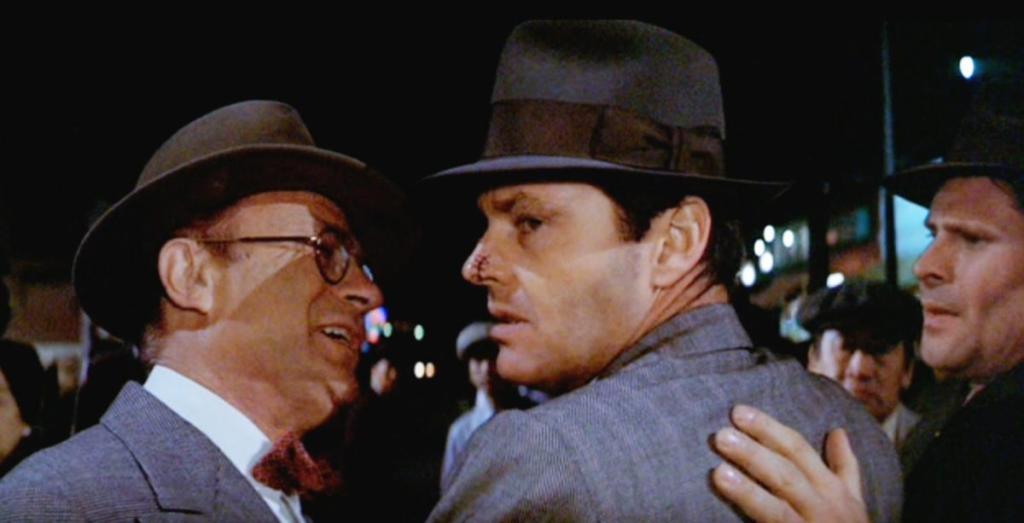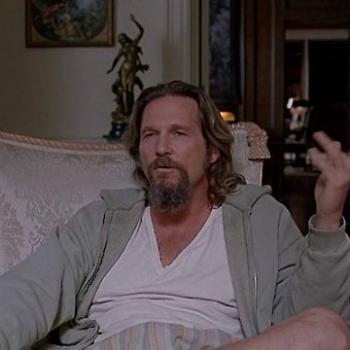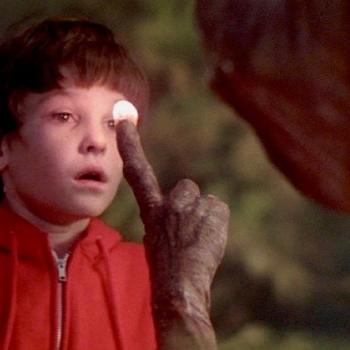
I really enjoyed talking last week about nihilism with The Big Lebowski, so I guess we’ll try this just one more time.
1974’s Chinatown sees Jake Gittes, a private investigator, hired to uncover the infidelities of a mid-level bureaucrat–only to discover there’s something wicked boiling under the surface. He wants to get to the bottom of what he correctly perceives as a twisted, unlawful situation, but he encounters fortified resistance all along the way. What starts as a simple investigation into a marital affair quickly erupts into something far more twisted–an abuse not only of civil resources, but human lives as well–something no good-hearted person may be able thwart. And at the end, the truth of his convictions is not enough to bring wicked men to justice, or even to save the woman he loves from being killed in the crossfires.
The film is perhaps most noted for its tragic ending in which the tortured Evelyn is killed, her daughter taken away, and the bad guy gets away. All Jack Nicholson can do is just stare at the scene helplessly. His partner assures him to not get so hung up over it, “Forget it, Jake. It’s Chinatown …”
The ending of Chinatown puts audiences in the position to wonder, in so many words, “… what’s even the point?” This movie came out following the Watergate scandal, and this ending that reflects both the deep sense of distrust America had in the systems at place as well as their own sense of helplessness in the face of this corruption. You see this attitude displayed early in the movie with when Gittes is at the barber. Someone comes after him for his work exposing the affair, and Gittes insists “It’s an honest living!” He retaliates against this man, a mortgage worker, for forcing people out of their houses, insisting that he’s not any better. I’m a crook, you’re a crook …
These kinds of movies aren’t normally in my wheelhouse. I’m the kind of guy who just wants to talk about It’s a Wonderful Life or Silver Linings Playbook all the time. But I recognize that movies like these don’t serve every condition of human experience. We need to know how to sit with texts that don’t end on a comforting note.
And so I want to explore the application of this kind of thought process for the believers of the world. The Christian narrative is ultimately one of hope and comfort. That story has a happy ending: Jesus rises from the dead, and he takes all of us for the ride as well. All of our aches and pains in mortality are swallowed up in the assurance that God will ultimately take care of us and correct all the injustices in the world. At its core, that is what draws so many to religion or spirituality. It feels almost contrary to the spiritual eye to dwell on feelings of hopelessness or to imagine that there is any situation in which righteousness cannot prevail.
And yet, hopelessness persists just the same, even for the most idealistic among us. Wicked men, systemic corruption, public apathy. These are all things that existed in the Bible, and no one had more cause for despair than the prophets of God. Feeling hopeless is part and parcel to having a heavenly perspective in a temporal plane. The question, I suppose, is what we do with those feelings. Could it ever be considered godly to choose not to immediately displace that sense of helplessness.
The way I see it … when someone you love has recently experienced a loss, our initial impulse can be to swaddle them with such assurances as “Heavenly Father has a plan for all of us,” or “They’re in a better place.” Those may be accurate statements, but they’re seldom of any comfort to those still in the throes of grief. The best thing we can do in this kind of situation is be present in their despair. Acknowledge that they have valid reasons for feeling distraught and let them climb out of that grief on their own time. And I think that’s how we can approach a lot of unpleasant emotions as they manifest in wider society.
In order to see this world and all its failings clearly, we sometimes have to study certain aspects of it in isolation: what is it like to be in that space where you’ve brought all your valiance and virtue to the fight, but the wickedness in place has quashed your best efforts? What do you do when in that moment where judgment day feels much too far away? Before you can fix anything, you have to first acknowledge that things kinda suck.
Could that serve as a reminder of what happens when godlessness infects the systems in place? Might that engender sympathy for someone else in a similar situation? Could any of that motivate a person to continue fighting? And might that eventually yield some meaningful change?
I have my theories about that.












